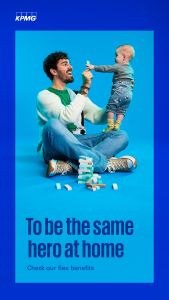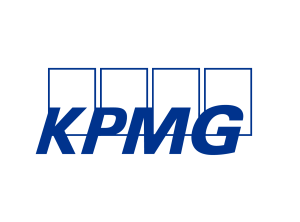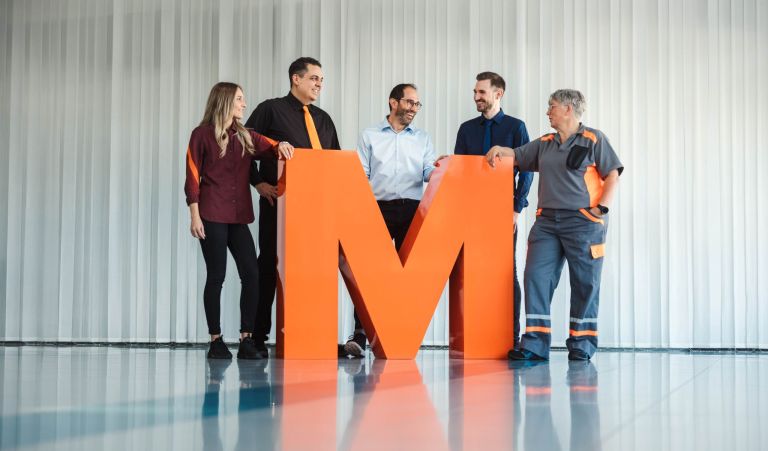This Best Practice was first published in the Gender Intelligence Report 2023.
At KPMG, we believe in the power of embracing individuality and providing flexibility as part of our Employee Value Proposition (EVP) – ‘come as you are.’ By offering greater flexibility, we not only enhance employee productivity and the overall quality of work, but also boost job satisfaction. In 2022, we introduced new flex working arrangements, establishing a solid foundation for empowering individuals at KPMG to achieve a better integration of their professional careers with personal lives. Our ultimate objective is to foster a working environment that enables our people to thrive. This commitment is symbolized by the artwork ‘All Colors Advancine’ by Pia Heim, selected for Inernational Women’s Day 2023, organized by Advance – Gender Equality in Business, and displayed in our Zurich headquarters. It complements our EVP by underscoring our dedication to inclusivity and our belief that unique experiences and perspectives enrich our culture and add value to clients and society.
To develop a diverse, adaptive, and high-performing workforce, KPMG offers various flex time options. In today’s fast-paced business environment, offering these arrangements to all employees is crucial for attracting and retaining top talent. It meets the demand for work-life integration, for example among Gen Z employees.


We believe in a people-centered approach that empowers each employee to choose the options that best suit their personal situation. Our updated policies reflect our commitment to adapting to the changing needs of our workforce. However, employees must always ensure that client needs are appropriately prioritized.
Our existing flexibility options include:
The new flexibility encompasses the following options:

“I really appreciate this flexibility. In the end it’s a win-win situation for both, the employer, and the employee.” – Anna Pohle
At KPMG, we aim to empower parents to successfully reconcile their personal ambitions with their professional aspirations. Flexible work is crucial for parents to balance their careers and family life. We recognize the growing importance for fathers within our organization to be present in their children’s lives. Through our internal communication channels, we highlight the benefits of flexible work arrangements, provide examples of successful fathers at KPMG working flexibly, and challenge gender stereotypes by showcasing achievements in both professional and personal lives.

By utilizing flex work opportunities to take on caregiving responsibilities and reduce their work hours, both men and women can support their partners in pursuing careers with higher workloads. This not only allows the partner reducing their work hours to independently secure their income and retirement savings but also contributes to closing the gender pay gap and promoting gender equality in the workforce.
For exploring these topics further and understanding the long-term implications of reducing working hours, read the KPMG and Advance whitepaper 2/2023 to be published in November 2023.

HR Business Partner Audit
Inclusion & Diversity Project Lead at KPMG

Maike Heller
Manager Human Resources
Inclusion & Diversity Project Member at KPMG

While introducing flexible work opportunities is a step in the right direction, promoting and encouraging their adoption among employees, especially men, is equally important. Effective promotion and communication are necessary to raise awareness and address concerns about negative career consequences or peer comments. At KPMG, we have already seen a few percent increase in men working part-time in 2022. Men seem more confident in sharing caring responsibilities and taking on responsibility at home. One employee, Noé Vuillé, Manager Audit Suisse Romande, exemplifies the positive impact of flexible work arrangements at KPMG, as he shares his experience of prioritizing his family and enjoying quality time with them. He states, “I work 90 percent, which allows me to take off every other Friday. I also extended my paternity leave for two and a half months after my second child’s birth. This period was very important to me, as it meant more time for us together as a family. I spoke to my management, partner, teammates, and clients, and everybody was open – the feedback and reactions were really positive. You just have to communicate well. I am really grateful for that time.”

KPMG’s implementation of greater flexibility has proven beneficial for both employees and the company. Our employees can benefit from enhanced well-being and fulfilment and can be at their best both inside and outside of the workplace. The option to work remotely from abroad has also received good feedback, with over 100 colleagues taking advantage of this opportunity since its introduction. Ersan Sucru, Senior Manager Tax Global Mobility Services (GMS), highlights the benefits of having the freedom to choose his work location at KPMG, enabling him to spend valuable time with his family in Germany. He explains, “Having the freedom to choose where I work allows me to spend precious time with my family in Germany. In this way I am easily able to balance my work and personal life while improving my sense of wellbeing.”

By offering these flex opportunities, we don’t just embody our motto of ‘dare to’; we actively pave the way for a more inclusive, diverse, and thriving work environment. At KPMG, we believe that empowering individuals to balance their professional and personal lives leads not only to personal fulfillment but also to a stronger, more successful organization.
Claudia Bär and Maike Heller are happy to share additional insights about KPMG’s commitment to empowering employees through flexibility and work-life integration. Please feel free to reach out to them at cbaer@kpmg.com and mheller@kpmg.com for a deeper understanding of their diverse initiatives that challenge traditional norms to foster a thriving workplace for all.
This Best Practice was first published in the Gender Intelligence Report 2023.

Discover how EY is leading a paradigm shift in the workplace by embracing flexible working arrangements. Explore their innovative strategies for getting clients on board with this transformative approach, fostering collaboration and driving business success.

NatWest champions working families through their comprehensive initiatives, such as Partner Leave, Phase-Back Program, and a Remote First approach. Uncover how they lead in creating a gender-balanced and inclusive environment that supports employees' specific needs.

Step into ABB's world and witness their groundbreaking gender-neutral parental leave program. Discover how ABB fosters a gender-balanced and inclusive environment, breaking boundaries and paving the way for working families to thrive.

Discover how Migros revolutionizes the workplace with its commitment to work-life integration. Explore their emphasis on part-time positions, hybrid work models, and leadership support, creating an environment where employees can flourish.

Implementing a holistic 4 pillar pay equity framework led to decreasing the pay gap to under 1% - and keeping it there.

Leaders insisting on pay equity and undertaking serious independent analyses builds trust and a culture of inclusion.

A customised internal salary modelling tool ensures fair salaries and strengthens employee confidence.

The full pay flexibility deal allows new parents to decide how they want to manage the transition back to work.

Looking beyond data helps Syngenta make pay equity a fundamental element of the company's culture rather than just a project to tick off.

Chances for promotions are equal for full-time and part-time employees thanks to a strong culture of flexible working.

#sharethecare shifts the narrative from ‘caregiving is strictly a woman’s responsibility’ to ‘caregiving is for both parents’. A bold ambition aiming to cultural change.

A gender diversity checklist makes sure that women have equal chances in the recruiting process.